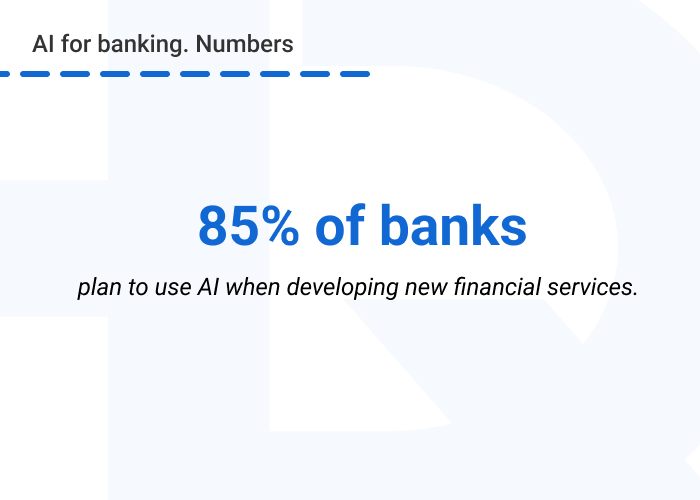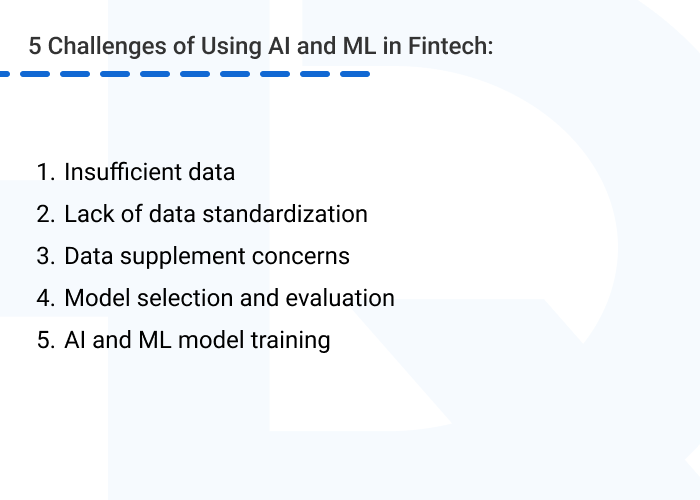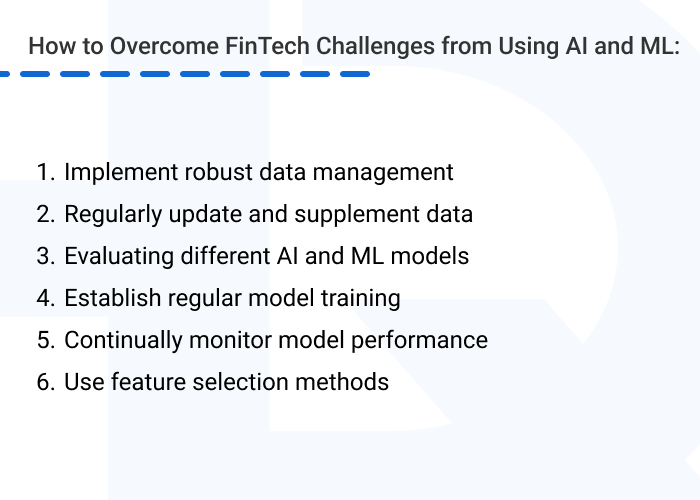5 Challenges of Using AI and ML in Fintech
Model selection and evaluation
On the journey of boosting your fintech business with Artificial Intelligence (AI) and Machine Learning (ML), data quality, security, and bias are just some of the challenges in fintech you should overcome to truly leverage these technologies.
In this blog post, we will explore the challenges faced by fintech companies when adopting AI and ML solutions and discuss strategies for dealing with them.
5 Challenges of Using AI and ML in Fintech
Model selection and evaluation
85% of banks plan to use AI when developing new financial services. Although the technologies have proved tremendously advantageous for customers, there are still certain fintech industry challenges to be addressed, such as:

For accurate analysis, AI and ML models heavily rely on high-quality historical and current data, such as transaction details, credit histories, company financials, and personal information. However, in newly established or rapidly growing companies, there may be a shortage of historical datasets for model training. Data may be missing, inconsistent, corrupted, or contain biases, which can become a problem with AI in finance.
For example, financial data can be spread across multiple systems, making integration, consolidation, and coping with conflicting data formats challenging. This data fragmentation can limit the availability of comprehensive datasets required for effective AI and ML applications. Moreover, missing, erroneous, or inconsistent data can lead to biased or untrustworthy models.
The best way to address this challenge is to leverage synthetic data generation techniques so that you will be able to imitate the characteristics and patterns of real-world data to augment the available dataset, providing additional samples for training and improving model performance.
Once you’ve collected all the data you need, determining an acceptable data type becomes the next problem with AI in finance.
For analysis, AI and ML algorithms receive data from various sources, which may be in different formats. Although some algorithms can handle this type of input, standardized data allows for more effective analysis and outcomes. So, before incorporating AI and ML solutions, it is critical to eliminate:
Addressing these inconsistencies helps to clean up the data and restore it to a standard view so that the models function as effectively as possible.
However, simply obtaining and normalizing financial data is not always enough. It’s also essential to establish a streamlined process for data receiving and updating.
For example, you gather a sizable amount of data, clean it up, and create a model that relies on it. But a month later, more data arrives in the same unclean format. You’ll now need to start the process from scratch, which can lead to errors in algorithms and insufficient models.
Another important factor is data drift, where the statistical characteristics of the data change over time. In fintech, data drift can be caused by market dynamics, client behavior, or regulatory changes.
Sufficient data supplementation is especially critical in areas such as stock market prediction, fraud detection, or real-time risk assessment, as outdated data can lead to suboptimal performance.
Need to enhance your fintech solution with AI/ML technologies? We’re ready to help!HQSoftware has a team of skilled professionals ready to tackle the project. Let’s talk!
Anna Halias
Business Development Manager
To address this challenge, you can supplement your existing dataset through API integration that enables you to automatically gather fresh information from multiple sources and combine it. You can also create a special data storage solution for quick access and efficient retrieval of historical and new data for AI model training and analysis.
Fintech encompasses a wide range of applications, such as credit scoring, algorithmic trading, risk assessment, and personalized financial recommendations, and each type of software requires individual AI and ML models.
Each model has its strengths and drawbacks, so there is no universal choice. As a software development company with experience in engineering AI solutions, we advise using the following steps when choosing an AI or ML model:
Overall, the most suitable model is one that reflects your specific goals, the type of software you need, available data, and regulatory requirements in your country.
The accuracy of AI and ML models depends not only on the data but also the training algorithms utilized. There are two fundamental training approaches.
Unsupervised learning is an approach in which a model is trained on data for a particular period without human intervention. Such a model is put into operation straight away and is adjusted only after it has been running for a certain period, when you can compare the model’s output with real operational data.
In supervised learning, a model consumes only a portion of the historical data. The remaining data are used as control values, to verify whether the model has been trained correctly. This is where the challenge lies.
When verifying the results, you might be tempted to artificially adjust a model so its data match control values. You might think this is the way to achieve the highest accuracy. But it’s more likely to result in “overtraining” your model, causing it to produce inaccurate results in practice.
In fintech, the supervised learning method is commonly used with huge amounts of data for classification, anomaly detection, image recognition, and regression. For example, predicting housing prices, sales forecasting, or credit scoring. Here the system identifies and analyzes hidden signs that a person may not be able to match.
One of the most effective ways to overcome this fintech industry challenge is to provide more diverse and representative training data. By exposing the model to a greater variety of patterns, variations, and scenarios in the data, the model generalizes better and reduces the risk of overfitting.

By following these steps and addressing the challenges in fintech proactively, you can harness the power of AI and ML to drive innovation, improve decision-making, and navigate the evolving landscape of financial services.
In general, handling the problems with AI implementation in fintech requires a comprehensive approach:

As you can see, ensuring the reliability of AI and ML models demands deep domain expertise and a lot of practical experience. So, the best way to easily overcome challenges in fintech and successfully implement AI and ML algorithms is to involve software development experts.
Overcoming the specific challenges of AI in finance is crucial to harnessing the full potential of AI and ML in this industry. As a financial software development company, we at HQSoftware have worked on numerous financial projects, finding the best ways to implement AI and ML technologies. With deep expertise in both AI and fintech, we are ready to advance your solution with:
Get in touch with us to find out more about AI and ML financial development services.

Head of Production
To ensure the outstanding quality of HQSoftware’s solutions and services, I took the position of Head of Production and manager of the Quality Assurance department. Turn to me with any questions regarding our tech expertise.
We are open to seeing your business needs and determining the best solution. Complete this form, and receive a free personalized proposal from your dedicated manager.

Sergei Vardomatski
Founder